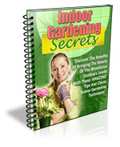Welcome to Gardening Guide
Organicgardeningtips Article
 . For a permanent link to this article, or to bookmark it for further reading, click here.
. For a permanent link to this article, or to bookmark it for further reading, click here.
Flower Gardening Tips
from:Finding good flower gardening tips can make a mediocre garden into a flourishing sanctuary of color and fragrance. For an attractive garden year round it is best to plan out the garden and plant according to environment and eco-system. Native plants will help to concede a positive outcome to provide an encouraging result.
Flower gardening tips suggest that the way to achieve optimum appeal through out the garden is to plant a palate of harmonizing colors and textures. All season blooming is a great choice as it provides a full embodiment of the space. Utilizing the garden year round is a way to provide a pleasing atmosphere to enjoy continuously. All seasoning blooming is usually achieved by planting different species that flower alternatively so the garden is always in constant burgeons. There are different choices when planting flowers. A Perennial is a flower that will last for more than one growing season and returns to flower and grow again. The Annual is a one time deal as the plant germinates, produces flowers and then dies. Bulbs are planted prior to the blooming season this planting takes place usually in the Fall.
Planning out the gardening area is the best bet to insure a satisfying finished project. A focal point is a necessity to draw the eye into the surroundings this is best achieved by the use of a gate or object placed in the garden that is different than the plants. Ornamental grasses can be used for this purpose. They also add texture and in some cases height to an area.
The pH levels in soil should be measured as this indicates the amount of Hydrogen ions present. In heavy rainfall regions, an acidic soil is produced and this is counteracted by adding Limestone. Sulfur is usually added to lessen the effects of Acidic soil in arid areas. Flower gardening tips suggest checking the levels in the soil as this is crucial to determine the best for different flowers. Soil consists of clay, sand, silt, loam, organic matter, rocks and minerals as well as pH levels. Adding compost adds nutrients to balance the pH level. Humus, also known as decomposing forest floor debris, is perfect for providing mulch when placed on top of the soil. Mulch provides a way of controlling weeds and helps retain moisture for healthy flowers. If drainage is a problem, suggestions of adding fine gravel under the soil will facilitate this.
For maximum resiliency of plants while transplanting, flower gardening tips say to carefully remove plant from its container and work the roots system to help stimulate the roots for development. It is indispensable to plant at the right planting level so the there is proper root expansion and plants can receive proper water amounts. Early morning or late afternoon planting on a cool or overcast day will furthermore assure the flower's success.
Consulting flower gardening tips will help achieve aesthetically pleasing surroundings as well as provide guidelines while gardening.
Organicgardeningtips News



